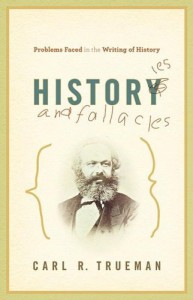“The past is a foreign country; they do things differently there.” –L. P. Hartley, The Go-Between
Carl Trueman’s Histories and Fallacies: Problems Faced in the Writing of History 
 (Wheaton: Crossway, 2010) devotes chapter 3 to the problem of anachronism (pp. 109–40) and concludes the book with this useful insight:
(Wheaton: Crossway, 2010) devotes chapter 3 to the problem of anachronism (pp. 109–40) and concludes the book with this useful insight:
 One notable thing about immigrating to a foreign country is that the very difference of the culture to which one moves allows one to see both the idiosyncrasies of one’s new culture and of that from which one has departed. When one only ever lives in one culture, the assumption is that everything one sees and experiences is nature, the norm, and that everybody else, to the extent that they do not conform, is deviant, subnormal, etc. Cross-cultural experience is excellent for disabusing one of such instincts.
One notable thing about immigrating to a foreign country is that the very difference of the culture to which one moves allows one to see both the idiosyncrasies of one’s new culture and of that from which one has departed. When one only ever lives in one culture, the assumption is that everything one sees and experiences is nature, the norm, and that everybody else, to the extent that they do not conform, is deviant, subnormal, etc. Cross-cultural experience is excellent for disabusing one of such instincts.
History can be like that . . . .
I have already mentioned my childhood antipathy to the Welsh rugby team, but many other things in my life, from taste in music to personal political convictions, are all more comprehensible in the light of wider historical factors. (pp. 172–74)

Hum….good insights and interesting implications. If I
rightly recall and understand, this fits nicely into Carson’s
category of “phenomenological pluralism” from The Gagging
of God.
I would second what Dr. Trueman says, and I think it’s even more the case when you live and work in a second language. It helps me understand how the Eastern and Western church fathers developed different ways of looking at biblical issues…